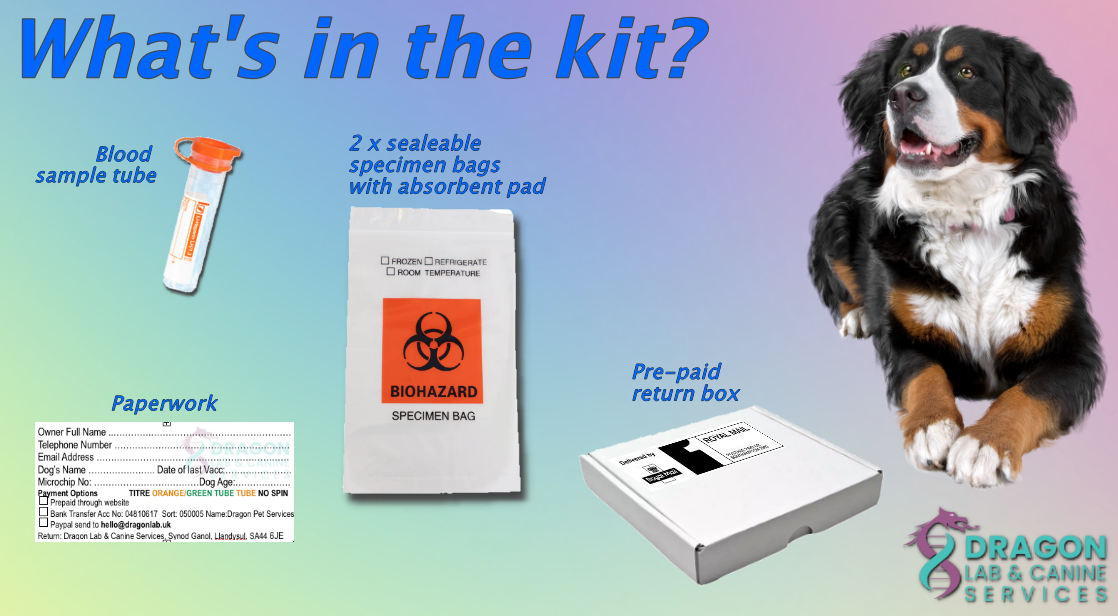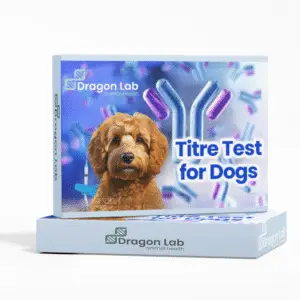Description
Our allergy testing for cats is a simple blood test.
Read more about allergies in cats here
Testing process
- You buy a test
- We send you a kit
- You send the blood sample back in the prepaid box provided.
- We analyse your dog’s blood sample and send you the results.
How to get a blood sample
- Contact your vet and ask for a blood draw into a 2mL sample tube.
- Sample tube
Hand-delivered samples
- Let us know that you are delivering the sample by calling/WhatsApp/text: 07813 664608 and to arrange payment
NO TIME TO ORDER A KIT?
Your vet can use their own sample tube.
This can be sent to us with your contact details included to:
Dragon Lab Animal Health, Synod Ganol, Llandysul, SA44 6JE
Why Choose Us?
Dragon Lab & Canine Services are experts in canine immunology.
We have over 20 years laboratory and canine immunology experience. This has gained us invaluable knowledge when it comes to canine immunology testing and vaccination guidance. Our lungworm testing service not only provides you with the numbers but also the knowledge and advice of our extensive experience.
All laboratory tests are run on-site following GMP and strict SOP protocols.
How does it work?
– Book an appointment with your vet for a blood draw
– Take your kit with you to your vet appointment and send the sample back to us.
– We will analyse the sample and get the results back to you on the same day that we receive it.
Titre tests can be performed at any stage of a dog’s life. However, the best time is shortly before they are due their ‘booster’. This lets you know if they actually need at ‘booster’ or not.
If you are wanting to titre test a puppy, it is best to wait until 3-4 weeks after their vaccination.
The higher the number the higher the titre or concentration of antibodies. The reporting range is from 0 (no antibodies detected) to 6. The results are always relative to a positive control.
A score of 2 and above is considered positive, meaning the animal is protected.
How often should I titre test?
The frequency of repeat titre testing is at the discretion of the owner. If your previous titre test result was borderline positive (1 or 2), then you may want to titre test sooner than if the result was a strong positive (3+).
Antibody titres can wane as animals get older and there may be a point at which an older dog may need re vaccination, however, this decision should be made on a risk analysis based on age and potential side affects from a vaccine at an older age and any other existing medical conditions.
You may feel that if you have younger dogs you are happy with testing less frequently. If you are testing to satisfy the requirements of a third party (ie dog boarder, kennel, council licensing etc), then please see their recommendations.
We recommend testing at 16 weeks, or 3-4 weeks after their vaccination.
Progesterone Testing
We recommend taking an initial sample at day 9 following your dog showing the first signs of bleeding. Subsequent tests/advice will depend on this initial result.
We try and limit the number of tests required to accurate predict ovulation. It is better to take an initial sample and retest 3/4 days after than to completely miss ovulation. Typically two or 3 tests are required.





